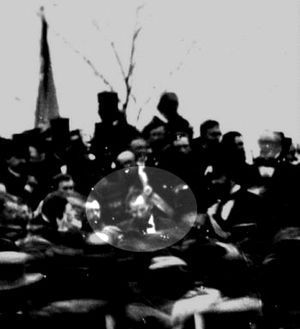Terry Teachout's Blog, page 39
November 22, 2013
WHAT BILL GATES IS BLIND TO
November 21, 2013
TT: Almanac
John P. Marquand, Women and Thomas Harrow
TT: Bill Gates, idiot
* * *
The big news in the art world last week was the record-busting auction at Christie's in which $142.4 million--a worldwide auction record for any work of art--was spent on "Three Studies of Lucian Freud," a 1969 triptych by Francis Bacon. You don't have to be a Marxist or an advocate of sumptuary laws to be made queasy by such numbers, much less to wonder whether something has gone wrong with the values of the world of art.
That said, it's one thing to bristle at big-bucks art auctions and another altogether to go along with Bill Gates, who said in a recent interview with the Financial Times that...well, I'll cite the story verbatim, since his remarks won't win any prizes for clarity:
 "Quoting from an argument advanced by moral philosopher Peter Singer, for instance, [Gates] questions why anyone would donate money to build a new wing for a museum rather than spend it on preventing illnesses that can lead to blindness. 'The moral equivalent is, we're going to take one per cent of the people who visit this [museum] and blind them,' he says. 'Are they willing, because it has the new wing, to take that risk? Hmm, maybe this blinding thing is slightly barbaric.'"...
"Quoting from an argument advanced by moral philosopher Peter Singer, for instance, [Gates] questions why anyone would donate money to build a new wing for a museum rather than spend it on preventing illnesses that can lead to blindness. 'The moral equivalent is, we're going to take one per cent of the people who visit this [museum] and blind them,' he says. 'Are they willing, because it has the new wing, to take that risk? Hmm, maybe this blinding thing is slightly barbaric.'"...Mr. Gates thinks it immoral for rich people to give money to museums instead of medical projects, presumably those that have received the official Bill Gates Seal of Moral Approval. To be sure, he deserves full credit for putting his own money where his mouth is: The Bill & Melinda Gates Foundation gives away some $4 billion a year, much of which is used to support health-related initiatives in developing countries, including a world-wide initiative to stamp out polio.
Good for him--but when it comes to art, he's got it all wrong, and then some....
* * *
Read the whole thing here .
TT: As good as Guinness
* * *
At last, a good new Broadway musical. Really good, in fact. Not only is "A Gentleman's Guide to Love & Murder" wickedly witty, wonderfully well staged and as pleasing to hear as it is to see, but it brings Jefferson Mays, the quick-change artist of "I Am My Own Wife," back to the New York stage in a major role--nine of them, in fact--for the first time since he starred opposite Claire Danes in the 2007 Roundabout revival of "Pygmalion." If you're tired of apologizing to out-of-town visitors for the shaky state of 21st-century American musical comedy, send them to "A Gentleman's Guide" and rest assured that they'll go home happy.
 The program is coy about it, presumably for legal reasons, but "A Gentleman's Guide" is based on the same obscure 1907 novel by Roy Horniman that Robert Hamer used as the source material for "Kind Hearts and Coronets," the 1949 movie in which Alec Guinness played the eight members of an aristocratic family who stand between Dennis Price and a dukedom, all of whom end up dead. To match wits with a universally acclaimed classic of film comedy is risky business indeed, but Robert L. Freedman and Steven Lutvak, the co-creators of "A Gentleman's Guide," have wisely chosen to go their own way, retaining the basic plot mechanism of "Kind Hearts and Coronets" (in which the victims, men and women alike, are all played by Guinness) but radically transforming the characterizations and inserting a firecracker of a surprise ending. Though I've stealthily hinted at its nature, I guarantee that you won't see it coming until it arrives--and it improves on the film!
The program is coy about it, presumably for legal reasons, but "A Gentleman's Guide" is based on the same obscure 1907 novel by Roy Horniman that Robert Hamer used as the source material for "Kind Hearts and Coronets," the 1949 movie in which Alec Guinness played the eight members of an aristocratic family who stand between Dennis Price and a dukedom, all of whom end up dead. To match wits with a universally acclaimed classic of film comedy is risky business indeed, but Robert L. Freedman and Steven Lutvak, the co-creators of "A Gentleman's Guide," have wisely chosen to go their own way, retaining the basic plot mechanism of "Kind Hearts and Coronets" (in which the victims, men and women alike, are all played by Guinness) but radically transforming the characterizations and inserting a firecracker of a surprise ending. Though I've stealthily hinted at its nature, I guarantee that you won't see it coming until it arrives--and it improves on the film!I wouldn't make so bold as to say that Mr. Mays improves on Guinness, but he's as good as his illustrious predecessor, than which there can be no higher praise. He shifts from character to character as effortlessly as he did in "I Am My Own Wife," and each successive part stands out sharply from its predecessors....
More Shakespeare on Broadway? Uh-huh, but this time it's courtesy of Lincoln Center Theater, which invited Jack O'Brien, lately of "The Nance," to stage a "Macbeth" in which Ethan Hawke, lately of "Before Midnight," takes center stage. Mr. O'Brien has come up with an austere-looking yet populist "Macbeth," a spook show tightly packed with grandiose theatrical gestures--blood and thunder, Nuremberg Rally-style lighting, gender-bending Weird Sisters--and performed by an exceptional team of players led by Anne-Marie Duff. Ms. Duff's Lady Macbeth is at once sexy and scary, eyeing her hapless husband as though she were a snake and he an unusually toothsome-looking mouse.
Few, I suspect, will be surprised to hear that Mr. Hawke is a callow, monochrome Macbeth--he sounds even younger than his 43 years--who never manages to make much of Shakespeare's verse. But the rest of the cast, especially Ms. Duff, Richard Easton, Brian d'Arcy James, Byron Jennings and Daniel Sunjata, is so strong that his shortcomings count for far less than you'd expect....
* * *
Read the whole thing here .
Jefferson Mays talks about A Gentleman's Guide to Love & Murder:
November 20, 2013
TT: Almanac
John P. Marquand, Women and Thomas Harrow
TT: So you want to see a show?
Here's my list of recommended Broadway, off-Broadway, and out-of-town shows, updated weekly. In all cases, I gave these shows favorable reviews (if sometimes qualifiedly so) in The Wall Street Journal when they opened. For more information, click on the title.
BROADWAY:
• Annie (musical, G, closing Jan. 5, reviewed here)
• Matilda (musical, G, nearly all performances sold out last week, reviewed here)
• Once (musical, G/PG-13, reviewed here)
• Twelfth Night (Shakespeare, G/PG-13, closes Feb. 1, reviewed here)
OFF BROADWAY:
• Avenue Q (musical, R, adult subject matter and one show-stopping scene of puppet-on-puppet sex, reviewed here)
• The Fantasticks (musical, G, suitable for children capable of enjoying a love story, reviewed here)
• Fun Home (musical, PG-13, unsuitable for children, newly extended through Dec. 29, reviewed here)
• Hamlet/Saint Joan (drama, G/PG-13, remounting of off-Broadway production, performed in rotating repertory, closes Feb. 2, original production reviewed here)
• Juno and the Paycock (drama, G/PG-13, far too dark for children, extended through Dec. 29, reviewed here)
IN SARASOTA, FLA.:
• Show Boat (musical, G, remounting of Goodspeed Musicals production, suitable for bright children, closes Dec. 29, original production reviewed here)
CLOSING SOON OFF BROADWAY:
• Good Person of Szechwan (play, PG-13, extended through Dec. 8, reviewed here)
CLOSING SOON ON BROADWAY:
• The Winslow Boy (drama, G, too complicated for children, closes Dec. 2, reviewed here)
November 19, 2013
TT: Almanac
John P. Marquand, Women and Thomas Harrow
TT: Snapshot
(This is the latest in a series of arts-related videos that appear in this space each Monday and Wednesday.)
TT: Thoughts on another anniversary
 Any critic who's forced to write short can't help but find inspiration in the Gettysburg Address. Has anyone said more in fewer words? On the other hand, as Aaron Copland said of the music of Mozart, "Any incommensurable thing sets up within us a kind of despair." What can a lesser writer possibly hope to learn from the Gettysburg Address beyond the painfully obvious fact that he's not Abraham Lincoln?
Any critic who's forced to write short can't help but find inspiration in the Gettysburg Address. Has anyone said more in fewer words? On the other hand, as Aaron Copland said of the music of Mozart, "Any incommensurable thing sets up within us a kind of despair." What can a lesser writer possibly hope to learn from the Gettysburg Address beyond the painfully obvious fact that he's not Abraham Lincoln?This is how Copland put it in an essay called "At the Thought of Mozart":
Paul Valéry once wrote: "The definition of beauty is easy: it is that which makes us despair." On reading that phrase, I immediately thought of Mozart. Admittedly, despair is an unusual word to couple with the Viennese master's music. And yet, isn't it true that any incommensurable thing sets up within us a kind of despair. There is no way to seize the Mozart music. This is true even for a fellow-composer, any composer--who, bring a composer, rightfully feels a special sense of kinship, even a happy familiarity, with the hero of Salzburg. After all, we can pore over him, dissect him, marvel or carp at him. But in the end there remains something that will not be seized. That is why, each time a Mozart work begins--I am thinking of the finest examples now--we composers listen with a certain awe and wonder, not unmixed with despair. The wonder we share with everyone; the despaire comes from the realization that only this one man at this one moment in musical history could have created works that seem so effortless and so close to perfection. The possession of any rare beauty, any perfect love, sets up a similar distress, no doubt....
That's how I feel about the A Major Piano Concerto--and the Gettysburg Address. Mostly they inspire and console me, but they also remind me of the terrible, irreducible fact of human inequality, which isn't quite what Lincoln had in mind. We are not what he was, or what Mozart was. All we can do is be who we are--and aspire, on occasion and insofar as possible, to be something better, something more.
* * *
Vladimir Horowitz plays the slow movement of Mozart's A Major Piano Concerto, K. 488:
Charles Laughton recites the Gettysburg Address in Ruggles of Red Gap, filmed in 1935:
TT: Off I go
 I'm off to Kansas City, where I'll be lecturing tonight about
Duke
(about which more
here
). From there I fly to Miami, with an intermediate stop in Smalltown, U.S.A., my first visit there since my mother's funeral. I return to Connecticut and Mrs. T late Sunday night.
I'm off to Kansas City, where I'll be lecturing tonight about
Duke
(about which more
here
). From there I fly to Miami, with an intermediate stop in Smalltown, U.S.A., my first visit there since my mother's funeral. I return to Connecticut and Mrs. T late Sunday night.For all these reasons, you won't be hearing anything more from me in this space until next week, save for the usual almanac entries and theatre-related postings.
See you around.
Terry Teachout's Blog
- Terry Teachout's profile
- 45 followers



